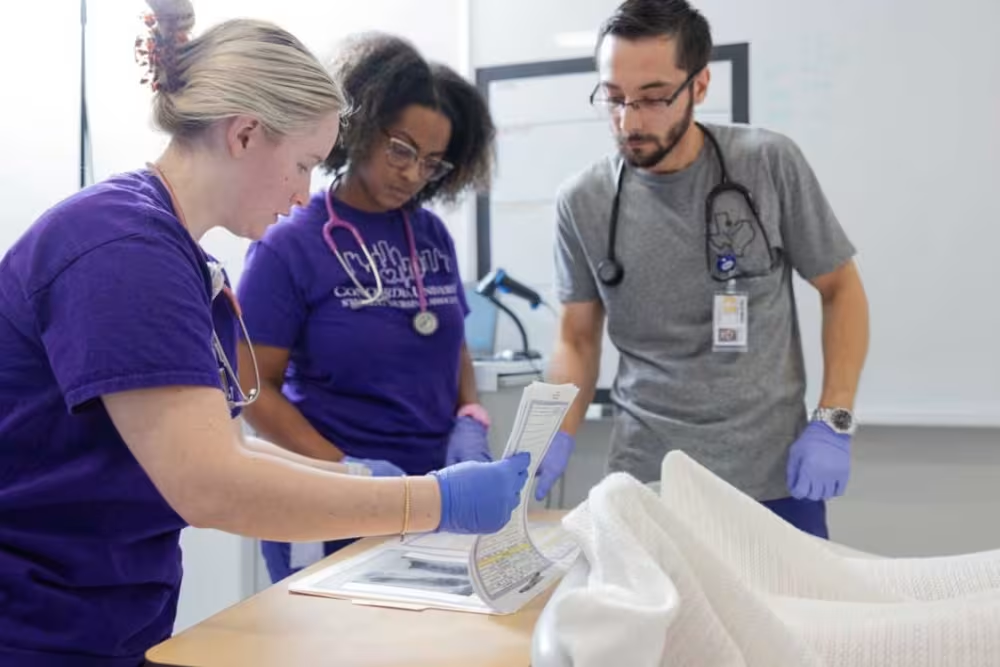Going Back to School for Nursing: What You Need to Know
Each blog post is dated and contains accurate information as of that date. Certain information may have changed since the blog post publication date. If you would like to confirm the current accuracy of blog information, please visit our ABSN overview page or contact admissions at (866) 891-1371.
Going back to school for nursing allows you to switch to a high-growth career with solid earning potential and options for specialization and career advancement. When making a career change to nursing, you don’t need to go to school for another four years or have healthcare experience.

It’s never too late to switch careers. If you’re unhappy or feel stuck in your current job, it’s possible to make a career change to nursing, even in your 40s, 50s, or 60s. Through a fast-track nursing program, going back to school for nursing can be more feasible than you might think.
Concordia University Texas’s Accelerated Bachelor of Science in Nursing (ABSN) track in Austin and Dallas-Fort Worth offers a faster pathway to a career change to nursing. The ABSN track allows students to earn a Bachelor of Science in Nursing (BSN) in as few as 16 months upon successful completion of prerequisite courses.
As you plan your career switch, you’ll want to consider your motivations, the benefits of a nursing career, what to expect from a nursing education, and what you need to be successful.

Discover the process for becoming a nurse with a non-nursing bachelor’s degree.
Consider These Benefits of a Career Change to Nursing
There are plenty of reasons why you might switch to the nursing field. A nursing career offers mental stimulation, daily opportunities for learning and overcoming new challenges, and the chance to help others navigate difficult situations.
Nursing is also a high-growth field. According to the U.S. Bureau of Labor Statistics (BLS), the job growth rate for registered nurses is expected to be 6% from 2023 through 2033, faster than the national average for all professions. At this rate of job growth, healthcare employers expect to hire about 197,200 new nurses during this period.
Another benefit of making the career change to nursing is the high earning potential. According to the BLS, the median annual salary for RNs as of May 2024 was $93,600.
With a nursing career, you’ll have the opportunity to choose from a wide range of specialties. For example, you might choose to specialize in pediatrics if you want to work with children or in oncology if you’d prefer to work with cancer patients.
Even for career switchers who start nursing later in life, there are opportunities for career advancement. You might decide to pursue graduate-level nursing education and earn board certification as an advanced practice registered nurse (APRN). Alternatively, you might consider becoming a nurse educator or manager.
In short, a nursing career is full of opportunities.

What to Consider When Going Back to School for Nursing
There are many factors to consider when going back to school for nursing, such as the timeline to graduation and whether you need healthcare experience. If you’re enrolling in nursing school later in life, know that many of your concerns don’t have to stand in the way of accomplishing your goals.
It Might Not Take Four Years
If you have a bachelor’s degree, returning to school for another four years is not ideal, especially if you want to become a nurse later in life. Fortunately, there are options for individuals with a bachelor’s degree or college credits.
Concordia Texas’s ABSN track is open to students with a non-nursing bachelor’s degree or at least 60 college credits. The accelerated track leverages your previous college credits, allowing you to graduate with a BSN in as few as 16 months after completing prerequisite courses.
The ABSN track offers the same quality of education you can expect from a traditional four-year program. It fully prepares students to take the NCLEX-RN exam with confidence, earn their nursing license, and complete their career change to nursing.
Prepare for the admissions process by learning what to expect from the nursing school prerequisites.

You Don’t Need Healthcare Experience
It’s not necessary to have any healthcare experience before going back to school for nursing. At Concordia Texas, we consider ABSN track applicants from all backgrounds.
While healthcare experience is not necessary, applicants to Concordia Texas’s ABSN track are required to earn their CPR certification from a Basic Life Support for Healthcare Providers course.
Hybrid Learning Makes School More Convenient
Another concern many students have as they return to nursing school later in life is whether they can balance student life with family and other responsibilities. The Concordia Texas ABSN track’s hybrid learning format makes this balance possible.
The hybrid approach combines online nursing theory coursework with in-person experiential learning. Through the e-learning platform, you will review course materials, complete coursework, and connect with peers and your instructors.
Online coursework provides the flexibility to complete assignments when and where it’s most convenient; however, you must still meet deadlines and attend the Austin or Dallas-Fort Worth nursing satellite campus for proctored exams.

Experiential Learning Provides Ample Practice
While coursework is completed online, hands-on experiential learning is still necessary to fully prepare for a nursing career. In the ABSN track, you will enjoy face-to-face instruction opportunities during nursing labs.
In nursing skills labs, you’ll practice performing critical nursing tasks, such as IV-line placement and wound care. In nursing simulation labs, you’ll work in small groups to navigate different clinical situations, from heart attacks to respiratory infections.
These lab experiences prepare you for clinical rotations. Concordia Texas has clinical partners throughout the Austin and Dallas-Fort Worth areas, so you can enjoy clinical placements at top healthcare facilities.
You’ll shadow experienced nurses and work alongside clinical instructors to provide direct patient care. You may complete clinicals in nursing specialties such as:
- Intensive care
- Long-term care
- Mental health
- Obstetrics
- Pediatrics
You’ll Have the Support of a Nursing Cohort
Nursing school can be challenging regardless of age, but it’s not impossible. When you are met with obstacles, you will have the support of your fellow students as you make this journey together.
Our nursing school follows the cohort model of education, in which groups of nursing students progress through courses, labs, and clinicals together. You will start and complete the nursing track on the same schedule, allowing for productive collaboration among peers and close friendships to develop. You’ll be able to lean on your cohort members for support and offer support in turn.

You’ll Need Excellent Time Management Skills
Nursing school is intense, no matter which track you’re in. You’ll need solid time management skills to navigate the curriculum successfully. As you consider going back to school for nursing, know that it will demand much of your time. Discuss your concerns with your support system outside of nursing school, so they can help you through your nursing journey.
It will also help to evaluate your time management skills and build better habits before nursing school, so you are fully prepared for the workload.

Try these 11 tips for success in nursing school.
How to Get Into Nursing School
Applying to nursing school can feel overwhelming, especially if it’s been some time since you graduated from college. Fortunately, at Concordia Texas, our admissions counselors provide personalized support tailored to your needs and situation.
The first step in the admissions process is completing the contact form, so an admissions counselor can call you. During your first phone call, they will review your eligibility for the ABSN track and help put together a plan for meeting any remaining requirements. These include:
- Passing the Test of Essential Academic Skills (TEAS) within three years of your enrollment date
- Earning CPR certification
- Ensuring immunizations are up to date
- Submitting an admissions essay
You might also need to complete some prerequisite courses. Your prior education might fulfill some of these requirements, such as chemistry and statistics. If not, your admissions counselor will help you enroll in the remaining courses, which are available online through Concordia University Texas.
Once you meet all the above requirements, you can submit your online ABSN track application and official transcripts.
Forge Your Future as a Nurse at Concordia University Texas
Concordia University Texas welcomes career switchers and other nontraditional students. Our ABSN track prepares you to become a compassionate and competent nurse leader. With dedicated nursing faculty and Academic Success Coaches to support your progress, a nursing career is within reach.
Contact an admissions counselor at our ABSN track today to get started. Your dedicated admissions counselor will help you put together a plan to prepare for admission and transition to nursing school.
